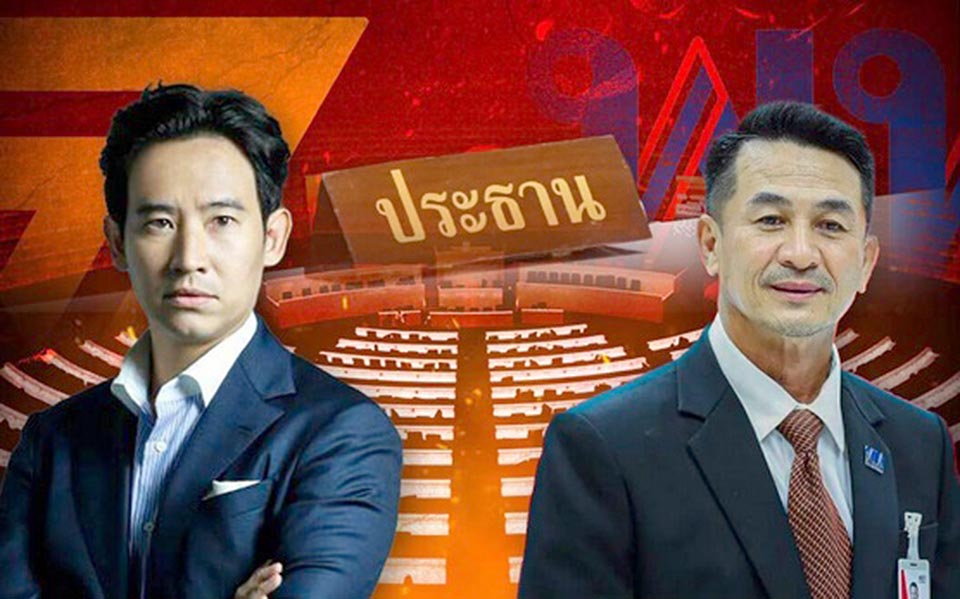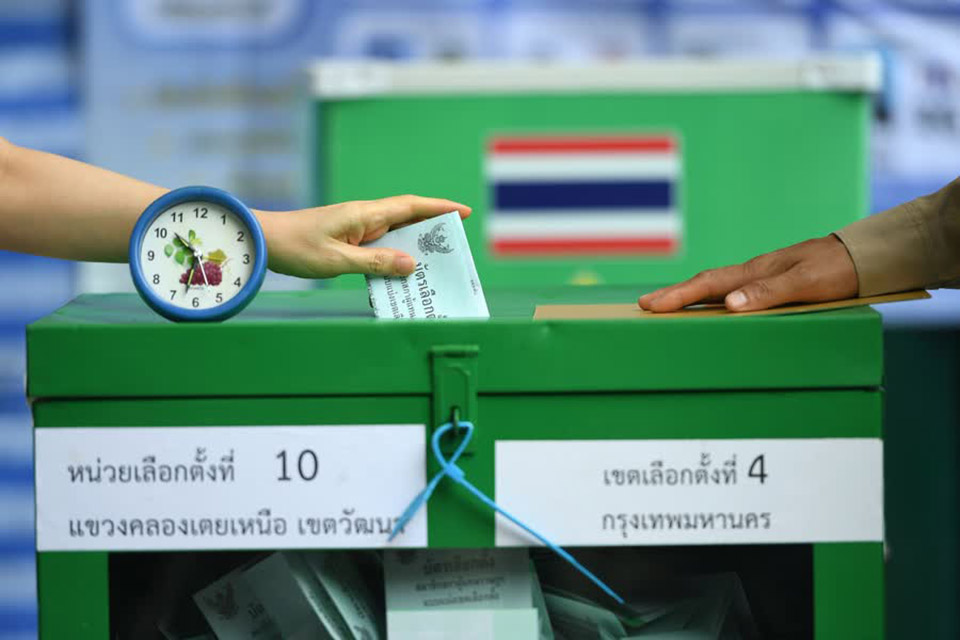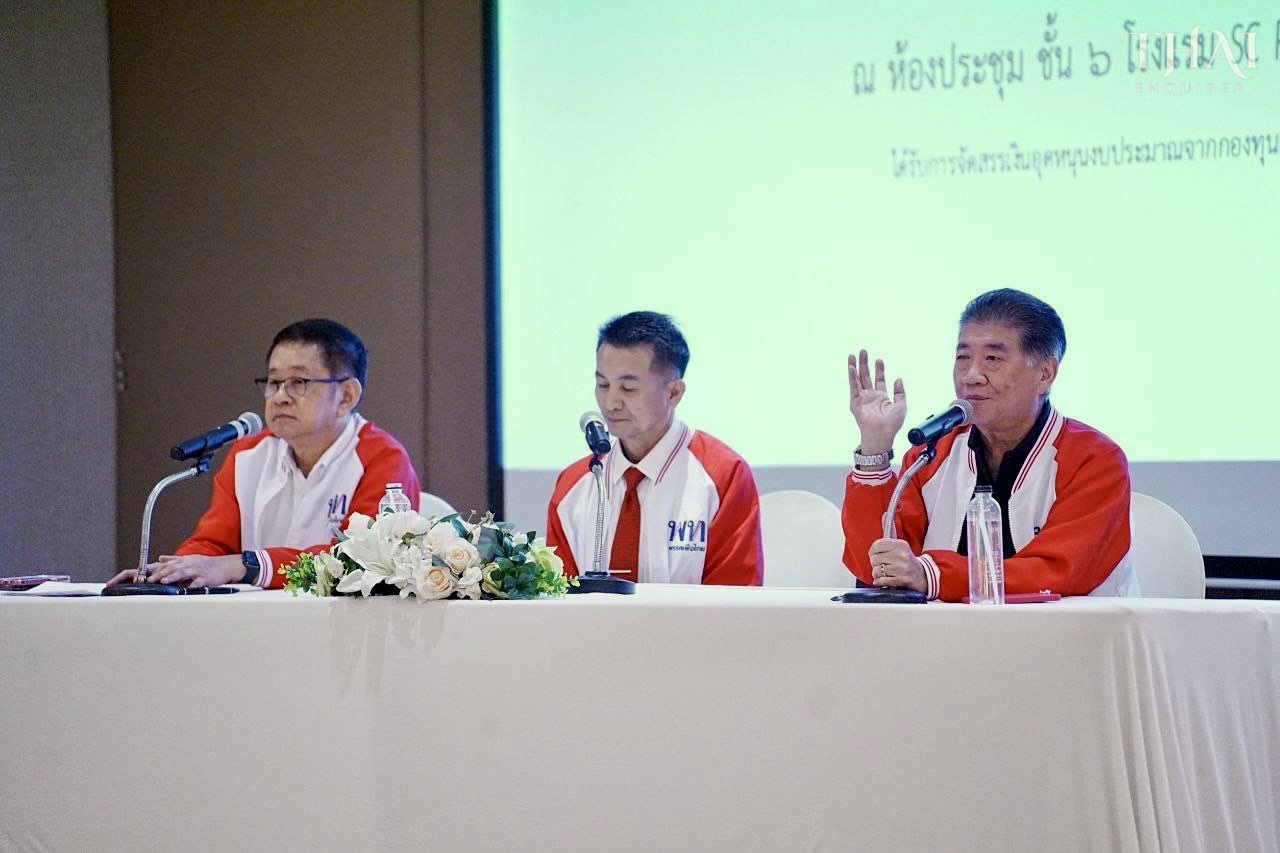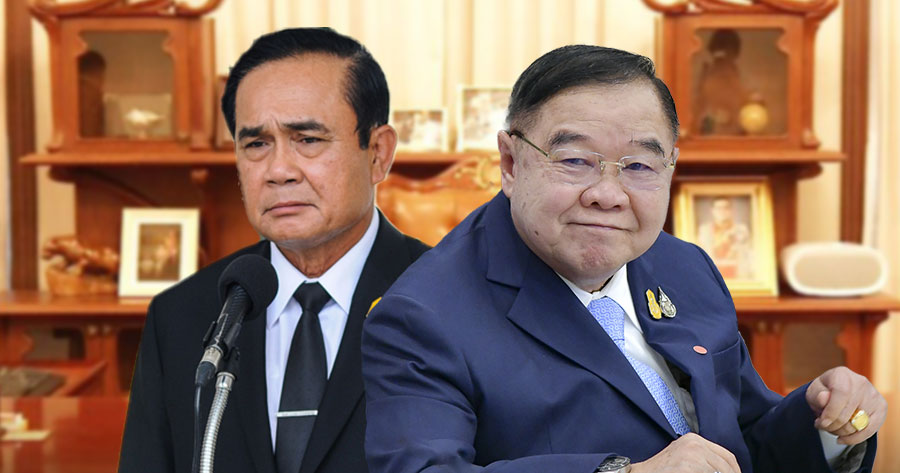According to analysts, Thailand’s Move Forward Party’s (MFP) chances of successfully creating a coalition government appear to be fading with each passing day, despite its best efforts to remain calm. They all agree that even if an MFP-led coalition wins power, it may rapidly disintegrate due to possibly fatal internal turmoil.
An early symptom of such struggle is already seen, between the MFP and the Pheu Thai Party, the two most likely coalition partners.
According to some observers, the “marriage of convenience” is doomed to collapse when the MFP requires Pheu Thai more than the other way around.
To begin with, while the Move Forward Party emerged as the largest party in the election, it is in the minority in terms of what many describe as its harsh political ideology, which the party seeks to implement as government policy.
Such a position is illustrated by the Move Forward Party’s diligent work on difficult and delicate matters. The proposed modification to Section 112 of the Criminal Code, or the lese majeste statute, is at the top of its agenda, and it is gaining more enemies than friends.
The party has had to deal with criticism from its most ardent followers, who have called the Move Forward Party a “disgrace” for backtracking on eliminating Section 112 entirely.
When it comes to altering the provision, Pheu Thai has stated that it would want to remain on the fence for as long as possible and is adamantly opposed to eliminating provision 112.
Paetongtarn “Ung Ing” Shinawatra, head of the so-called Pheu Thai Family and the party’s No. 1 prime ministerial candidate, has stated that if and when legislation controlling a law reform is introduced, Pheu Thai would consider debating Section 112 in parliament. However, the party has indicated that it will only go so far in terms of collaboration in the topic.
According to commentators, the Move Forward Party’s position on the Section 112 dispute has isolated, if not ostracised, the party, and being alone at this critical juncture is not at all beneficial.
Political events are looming that will either shatter or make the MFP as a ruling party. Parliament will tentatively meet the day after it reopens following the election to pick a new House speaker on July 6.
According to the Bangkok Post, the House speaker election will determine whether the Move Forward Party has a chance to head the next administration.
Both the MFP and Pheu Thai are adamant about gaining control of the legislative branch. The MFP sees it as a critical route for listing the laws it wants to push into the parliamentary agenda, whilst Pheu Thai believes that as the coalition’s second-largest partner, with only 10 seats less than the MFP, it deserves the job just as much as the MFP.
Several previous House speakers did not represent the majority party. Despite being the fourth-largest party in the 2019 election, Democrat Party patriarch and former premier Chuan Leekpai was elected House speaker and parliament president.
It is typical for parties to enter into a gentleman’s agreement to vote for a House speaker from within their own ranks after reaching an agreement with potential coalition partners to establish a government. That is, provided that no two potential coalition partners are bidding for the position.
This time, the MFP and Pheu Thai are colliding, paving the way for a free vote to select the new House speaker. If that is the case, there will be no “customary” voting pattern, as the MFP and Pheu Thai will be fighting for the position.
Nonetheless, Pheu Thai’s nominee is likely to receive more support, even from the opposition bloc, than the MFP’s.
Parties, including those in the current government coalition led by the Palang Pracharath Party, have more in common with Pheu Thai than with the MFP, notably on Section 112.
Not only do these parties not consider deleting or even revising Section 112 to be a priority, but they also feel it might spark huge protests, jeopardising the life of a government.
Observers believe that if Pheu Thai wins the speakership, it will sever what remains of its good relations with the MFP, jeopardising the latter’s chances of winning Pheu Thai’s support for Pita Limjaroenrat, the MFP leader, becoming premier.
The prime minister’s election in parliament has been moved up since the polling agency validated all 500 MPs ahead of schedule. Without the support of Pheu Thai’s 141 MPs, Mr Pita has no chance of becoming the country’s next leader.
After the Election Commission (EC) endorsed all 500 newly-elected MPs, political parties are preparing for their first critical vote.
The first parliamentary session must be summoned within 15 days of the EC endorsing at least 95% of all MPs-elect, according to Section 121 of the constitution.
Following the official opening, their first responsibility will be to select the House speaker and two deputies from among themselves. It is largely assumed that they will be chosen within 10 days of the new legislative session commencing.
The Move Forward Party (MFP) and the Pheu Thai Party, both candidates for speaker, are currently discussing on who will lead the legislative branch.
According to analysts, it is not surprising that both believe they are entitled to the post given their House seats won in the May 14 election were not far away.
The MFP, which received 151 seats, maintains that it is traditionally entitled to the post as the election winner. With numerous critical items of legislation that the MFP is required to introduce in parliament, the party feels compelled to acquire the gavel.
Pheu Thai, which got 141 seats, claims that because the difference in seats won by the two parties is so minor (only 10 seats), the position of House Speaker should go to it.
Furthermore, in comparison to the MFP’s “novices,” Pheu Thai has numerous candidates who are well-versed in laws and parliamentary procedures.
The two sides’ issue disappeared from media attention once they resolved to settle it through conversation. The matter resurfaced early this week, however, when Pheu Thai deputy leader Phumtham Wechayachai was quoted as stating his party had agreed to hand over the position to the MFP in exchange for two Pheu Thai deputy House speakers.
While several academics praised Mr Phumtham’s words and Move Forward Party secretary-general Chaithawat Tulathon for honouring the voices of the people who voted for the two parties, some Pheu Thai MPs were enraged and did not hide their feelings.
They requested that Mr Phumtham first debate and resolve the matter within the party.
Despite the fact that the Move Forward Party gained just 151 seats, far short of a majority in the 500-seat house, Pheu Thai list-MP Adisorn Piangket feared the party was making too many compromises.
Previously, the experienced lawmaker proposed that if the two parties could not achieve an agreement on the subject, it should be resolved by a free vote in parliament.
“We’ve agreed to let the Move Forward Party be prime minister, so why should we cave to their demand for the House speakership?” I wouldn’t say anything if the Move Forward Party won by a landslide. “They only got 151 seats,” Mr Adisorn remarked.
According to him, Pheu Thai has done all possible to avoid clashes with the MFP in order to keep the bloc together and prevent the other side from forging a rival coalition led by Palang Pracharath Party (PPRP) leader Prawit Wongsuwon as prime minister.
Mr Adisorn stated that as long as the Senate is able to co-select the prime minister, a PPRP-led minority administration with 188 seats from the former governing coalition cannot be ruled out.
“We’ve tried not to incite conflict because we’re concerned about a competing coalition.” “The coalition government may nominate Gen Prawit as Prime Minister, and it is possible that he will receive Senate support and defeat the MFP leader,” he said.
Mr Phumtham, on the other hand, has stressed that he did not mean to imply that the party was abandoning its bid for House Speaker. In fact, he was advocating the concept that the position should be given to the party that received the most votes in the general election.
According to a Pheu Thai source, the party is backing down in its fight for the top legislative job because key players in both Pheu Thai and the Move Forward Party don’t see how MFP leader Pita Limjaroenrat can overcome the challenges he confronts in becoming prime minister.
To support Mr Pita’s bid, the MFP-led coalition requires 376 votes in parliament from MPs and senators. Given his dubious qualifications, convincing MPs and senators to vote for him will be difficult.
“The Move Forward Party will desperately need the House Speaker position to compensate for losing the PM role.” “Pheu Thai understands this and will give the House Speaker position to the MFP,” stated the source.
Thailand’s Senate probes Move Forward Party Leaders assets
Pita Limjaroenrat, the head of the Move Forward Party (MFP), may face additional obstacles in his campaign to become the next Prime Minister, as a Senate panel is currently investigating problems connected to his assets and debts disclosure.
This could call his qualifications into question and convince more senators not to vote for him in parliament.
Senator Seree Suwanpanont, chairman of the Senate committee on political development and public engagement, announced on Friday that the committee had initiated a new investigation into Mr Pita’s qualifications and eligibility to run in the May 14 election.
“The committee is gathering information from appropriate agencies.” It concerns issues about Mr Pita’s assets and debt, both of which are related to his qualifications,” Mr Seree explained.
Mr Seree stated on June 8 that political activist Ruangkrai Leekitwattana, a Palang Pracharath Party (PPRP) member, had petitioned the Election Commission (EC) to investigate whether Mr Pita’s land plot in Prachuap Khiri Khan’s Pran Buri district is an asset he inherited from his father, who died in 2006.
Mr Ruangkrai also requested that the poll agency obtain details about Mr Pita’s assets and debts declaration from the National Anti-Corruption Commission for use in the investigation, according to Mr Seree.
According to a source, the most recent issue involving Mr Pita involves Oil For Life Co, a business managed by Mr Pita’s family, and Mr Pita worked as its executive between October 5, 2006, and March 6, 2017.
According to the source, the company has a loan debt of 460 million baht and filed for rehabilitation with the Central Bankruptcy Court after multiple financial institutions, which are its debtors, took court action to collect debt repayments.
Mr Seree went on to state that 20 senators have pledged support for any prime ministerial candidate from the party that received the most votes in the election.
“However, most of those senators did not mention Mr Pita’s name.” As far as I know, some of those who did mention Mr Pita’s name have since changed their minds.”
It involves questions with Mr Pita’s assets and obligations, which are tied to his qualifications, according to Senator Seree Suwanpanont.
The EC is also looking into Mr Pita’s claimed ineligibility to run in the election due to his ownership of iTV Plc at the time.
Mr Pita, the Move Forward Party’s sole candidate for prime minister, is suspected of being unable to run since he possessed 42,000 shares in iTV, which some critics claim is an operating media corporation, when he declared his candidature in the previous election.
Mr Pita has refuted the accusation, claiming that he was merely acting as executor of the family’s inherited shares.
Thitichet Nuchanart, an EC member, stated that the EC would question iTV executives including Mr Pita.
Mr Thitichet stated that the EC would also look into additional evidence linked to the claims, such as the record of iTV’s most recent shareholder meeting and the transcribed minutes.
A difference between the official minutes of the shareholders meeting and a video of the April 26 event has added to the debate concerning iTV’s position as a running media firm.
Mr Thitichet stated that more information about Mr Pita’s assets declaration with the NACC would be required for the EC’s probe.
According to Pol Maj Gen Supisarn Bhakdinaruenart, an MFP list-MP, the party’s executives told members not to respond to senators who have been critical of the party.
However, he stated that conversations are underway to gain their support, and that there are encouraging indicators that Mr Pita would acquire enough traction to become the next Prime Minister.
The 250 senators nominated by the now-defunct coup-engineering National Council for Peace and Order can vote in parliament to elect a prime minister alongside MPs.








